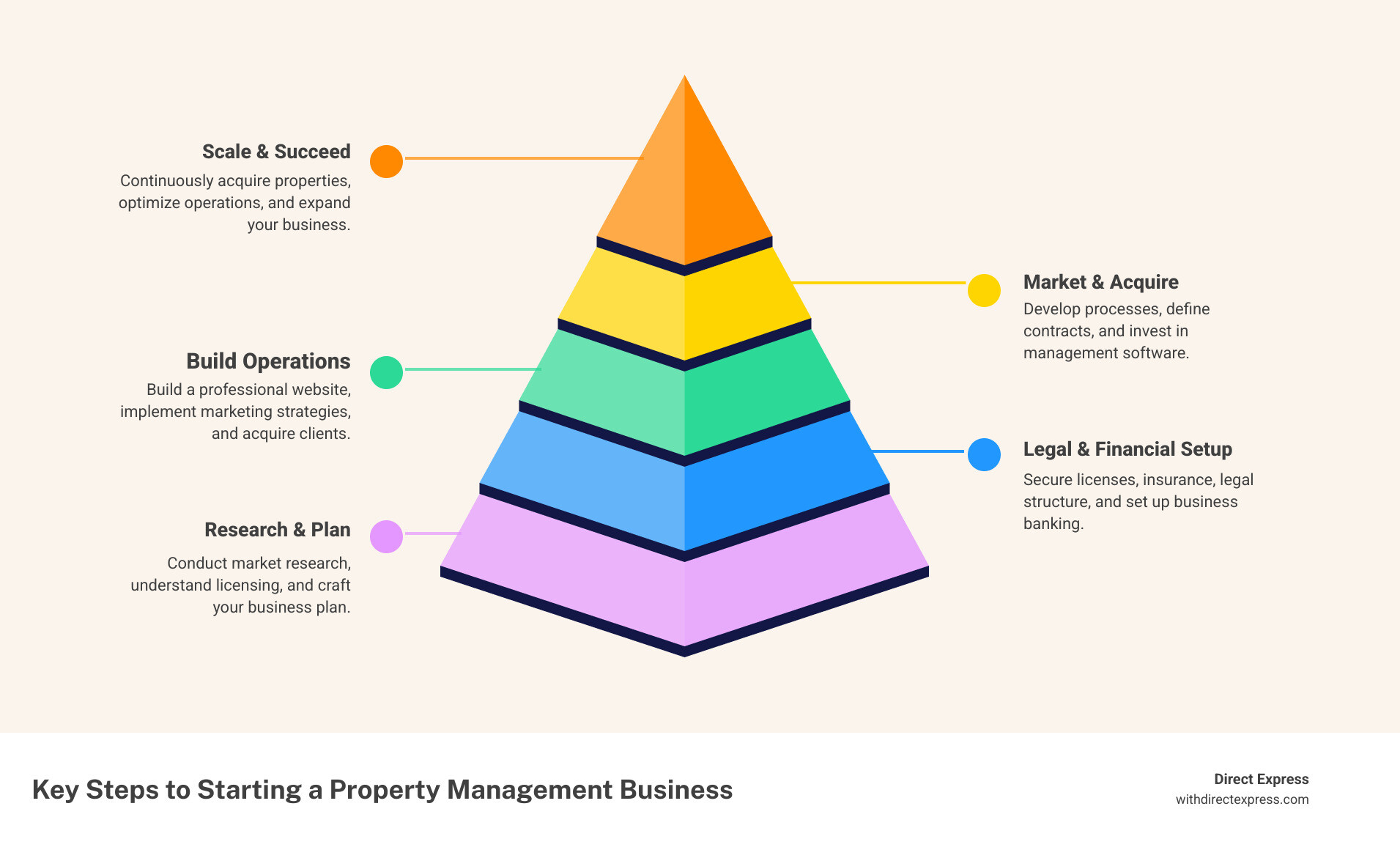Why Property Management is a Lucrative Business Opportunity
A property management business involves overseeing residential, commercial, or industrial properties on behalf of owners, handling everything from rent collection to maintenance and tenant relations. Here’s what you need to know:
Core Responsibilities:
- Rent collection and financial reporting
- Tenant screening and lease management
- Property maintenance and repairs
- Legal compliance and evictions
- Marketing vacant properties
Market Opportunity:
- Industry projected to surpass $26 billion by 2026
- 45% of rental property owners self-manage (potential clients)
- Property managers typically charge 8-12% of monthly rent
- Low startup costs ($2,000-$20,000 depending on scale)
The property management industry produces $99.4 billion in annual revenue, making it one of the fastest-growing sectors in real estate. With almost 21 million mom-and-pop investors currently managing their own properties, there’s enormous opportunity for professional management companies to step in and provide valuable services that landlords desperately need.
Property management offers contractual recurring revenue, sticky clients, no inventory, and negative working capital – making it an attractive business model for entrepreneurs looking to enter the real estate space. However, success requires understanding the demanding nature of the work, from handling emergency maintenance calls to navigating complex landlord-tenant laws.
I’m Joseph Cavaleri, CEO of Direct Express Rentals, where I’ve built and operated a successful property management business for over two decades while also leading real estate brokerage and construction ventures. Through my experience managing countless residential and commercial properties, I’ve learned the key strategies that separate thriving property management companies from those that struggle to scale.

Related content about property management business:
Foundations of a Successful Property Management Business
Picture this: you’re sitting in your office when the phone rings. It’s Mrs. Johnson, whose tenant just called about a leaky faucet. Twenty minutes later, you’re coordinating with your plumber while simultaneously screening a potential tenant for another property. This is the reality of running a property management business – it’s dynamic, challenging, and incredibly rewarding when done right.

At its heart, property management is about being the reliable bridge between property owners and tenants. We handle the daily headaches so property owners can enjoy passive income without the 2 AM emergency calls. This involves several core responsibilities:
Rent collection is the backbone of our operations. We set market-based rents, collect payments, and manage late fees, protecting our clients’ cash flow and profitability.
Tenant management is a balancing act. We thoroughly screen applicants and, once they move in, serve as their main contact for all issues, enforcing the lease fairly while maintaining positive relationships.
Maintenance coordination keeps properties in top shape. We handle routine and emergency repairs, conduct inspections, and leverage a network of reliable contractors to ensure quality and speed.
Financial reporting goes beyond bookkeeping. We track all finances, provide owners with monthly statements, and keep detailed records for tax purposes, ensuring accuracy and transparency to protect their bottom line.
Legal compliance is crucial. We stay current on all landlord-tenant laws, fair housing regulations, and safety codes. Our knowledge, from lease agreements to eviction procedures, prevents costly legal errors.
The advantages of starting a property management business are compelling. Startup costs are accessible, typically ranging from $2,000 to $20,000. The business enjoys recurring revenue from monthly management fees (usually 8-12% of rent) and creates sticky client relationships. However, the work can be demanding with irregular hours. Emergency calls don’t respect weekends, and the potential for burnout is real. We also face the constant pressure of keeping both property owners and tenants satisfied.
Types of Properties You Can Manage
The beauty of a property management business lies in its versatility. You can specialize or diversify across different property types:
Residential properties like single-family homes and small apartment buildings are a great starting point, focusing on tenant comfort and relationships.
Commercial properties such as office buildings and retail spaces involve longer leases and higher fees but have more specific business needs.
Industrial properties like warehouses are a niche market with less competition but require specialized knowledge of industrial equipment and environmental compliance.
Special-purpose properties like senior living or student housing require understanding unique regulations and tenant needs, often commanding premium fees.
The key difference is focus: residential management is about individual tenant relationships and quick turnarounds, while commercial involves long-term business relationships and complex lease agreements.
Essential Skills for a Property Manager
Success demands a diverse skill set that combines business acumen with people skills.
Communication skills are essential for managing expectations and building trust with owners, tenants, and vendors.
Organizational skills are crucial for tracking multiple properties, tenants, and maintenance requests without letting details slip.
Financial acumen is needed to analyze rents, prepare budgets, and maximize our clients’ investment returns.
Problem-solving abilities are tested daily by everything from emergency repairs to tenant disputes, requiring calm, quick thinking.
Legal knowledge is non-negotiable for understanding fair housing laws, eviction procedures, and local regulations to protect our clients.
Customer service focus is the key differentiator. Exceptional service for both owners and tenants creates loyalty and referrals.
The Blueprint: Planning and Legal Setup
Getting your property management business off the ground requires more than just enthusiasm. Think of this phase as building the foundation of your house – skip any steps here, and you might find yourself dealing with costly problems down the road.
Choosing a legal structure is a critical first step. While a sole proprietorship is simple, it leaves personal assets exposed. An LLC (Limited Liability Company) is often the best choice, protecting your personal assets from business liabilities with simpler tax rules than a corporation. Always consult a lawyer and accountant to choose the right structure for your situation.
Navigating licensing is a common hurdle, as rules vary by state. Many states require a real estate broker’s license to collect rent or negotiate leases for others. Some have specific property manager licenses. Research your state’s specific regulations thoroughly; it’s always better to be licensed to avoid legal trouble.
Business insurance is your safety net. Errors and Omissions (E&O) insurance protects you from claims of professional mistakes, while general liability covers injuries or property damage. If you have employees handling funds, you’ll also need fidelity bonds to protect against theft. One lawsuit can be devastating, making insurance a necessary investment.
Crafting Your Property Management Business Plan
Writing a business plan forces you to think through problems before they happen and gives you a roadmap for success.
- Executive summary: Your written elevator pitch, summarizing what makes your company special and why owners should choose you.
- Company description: Tell your story, outlining your vision and the values that guide your business.
- Market analysis: Identifying your target market—like mom-and-pop landlords or larger investors—and understand their biggest challenges.
- Services offered: Be specific about what you do, whether it’s full-service management or tenant placement only, to set clear expectations.
- Marketing and sales strategy: Outline how you’ll find clients and generate consistent leads beyond word-of-mouth.
- Financial projections: Crucial for forecasting revenue and expenses to ensure your business model is viable.
Financial and Legal Compliance
Getting your financial house in order early saves massive headaches later. Startup costs typically range from $2,000 to $20,000, covering licensing, insurance, software, and marketing.
Set up separate business bank accounts immediately. This protects you legally and simplifies accounting.
Understanding landlord-tenant laws is the foundation of your business. These laws, like the Residential Tenancies Act in Ontario, govern everything from security deposits to evictions and vary by location.
The Fair Housing Act is a federal law that applies everywhere, protecting tenants from discrimination. Violations carry severe penalties.
Invest in professionally drafted contracts and lease agreements that comply with local laws. They are your first line of defense in any dispute.
Operations and Growth: Running Your Business
Once your property management business is legally established, the exciting part begins – running the business and watching it grow. This is where your preparation pays off.

Setting a clear fee structure is a key operational decision. The most common model is a percentage of monthly rent (8-12%), which aligns your income with the property owner’s. Other options include flat monthly fees for predictable income, leasing fees (often one month’s rent) for placing new tenants, and small maintenance markups. You can also charge for other services like eviction processing or lease renewals. Transparency in pricing is crucial for building client trust.
A thorough tenant screening process is the backbone of good management. We go beyond credit scores to conduct credit history reviews, criminal background checks, and employment verification. This diligence minimizes future problems and vacancies.
Effective maintenance protocols are essential. We establish clear procedures for all repair requests and build a network of reliable contractors. Our integrated construction management services allow us to handle everything from minor fixes to major renovations seamlessly.
Even with perfect systems, challenges will arise. Tenant disputes require patience and fairness, while vacancies demand quick and efficient marketing to minimize lost income for owners.
Marketing Your New Property Management Business
Growing your client base requires a smart marketing approach that builds trust and showcases your expertise.
- A professional website is your digital headquarters and first impression. When choosing a domain name, aim for something memorable. Your site should clearly explain services, feature testimonials, and have an easy contact method.
- Social media marketing on platforms like Facebook and LinkedIn helps you connect with local property owners and real estate professionals.
- Networking with real estate agents creates powerful referral relationships. Our integrated buying and selling services make us a valuable partner for them.
- Content marketing through blog posts establishes your authority and draws in property owners searching for solutions online.
Leveraging Technology for Efficiency
Technology transforms how we run our property management business, making us more efficient and providing better service.
Property management software becomes your command center. Look for platforms with tenant portals for online payments and maintenance requests, and owner portals for 24/7 access to financial reports.
These platforms streamline lease management with digital signing and automated reminders, and maintenance tracking to manage work orders efficiently. Accounting software integrates with these systems to keep finances organized.
When we invest in the right technology, we’re investing in our ability to scale. The initial costs pay for themselves through improved efficiency and client satisfaction, allowing you to focus on growth rather than paperwork.
Frequently Asked Questions about Starting a Property Management Business
Starting a property management business can feel overwhelming. We’ve been there, so let’s tackle the big questions to help you move forward with confidence.
How much does it cost to start a property management company?
The cost depends on your scale, but a professional launch typically requires $10,000 to $20,000. A leaner start from home can be done for as little as $2,000. Major expenses include licensing fees, insurance premiums (E&O and general liability), property management software subscriptions, and initial marketing costs. While these are upfront investments, your ongoing expenses are predictable against the recurring revenue from management fees.
Do I need a real estate license to manage properties?
In most states, including Florida, the answer is yes if you’re managing properties for others. Activities like listing properties, negotiating leases, and collecting rent for clients in communities like St. Petersburg or Tampa Bay typically require a real estate broker’s license. Some states have specific property manager licenses with different requirements. If you only manage your own properties, a license usually isn’t needed. Always check with your state’s real estate regulatory body to ensure compliance.
How do property management companies make money?
The primary revenue stream is the monthly management fee, usually 8-12% of the collected rent. This provides stable, recurring income. Another major source is the leasing fee for placing new tenants, often 50-100% of the first month’s rent. Additional income comes from maintenance markups, where a small percentage is added to coordinated repair costs, and other service fees for tasks like lease renewals, inspections, or eviction processing. This diversified income model creates a financially stable property management business.
Conclusion
Starting a property management business represents one of the most exciting opportunities in today’s real estate market. Success comes down to preparation, dedication, and understanding what makes this industry tick.
The key takeaways are clear: Understand the scope of work, from tenant relations to legal compliance. Plan diligently by creating a solid business plan and legal structure. Accept technology to improve efficiency and service. Finally, master your local market to become an invaluable expert for property owners in areas like St. Petersburg or Tampa.
The path to success is built on trust, efficiency, and genuine care for both property owners and tenants. As more investors recognize the value of passive income, the demand for professional property management business services continues to grow.
At Direct Express, we’ve seen the power of integrated services firsthand. By offering property management alongside buying, selling, investing, construction, and plumbing, we create a seamless experience. When a client buys an investment property with us, the transition to our management team is effortless. If a major repair is needed, our in-house construction team takes over, ensuring continuity and quality.
This comprehensive approach means our clients get coordinated expertise for their entire property journey. There’s no need to juggle multiple companies; everything works together under one roof.
The rental market shows no signs of slowing down, and professional property management becomes more valuable every year. If you’re ready to build something that provides real value to property owners while creating recurring revenue, this industry offers incredible potential.
Whether you’re launching your own venture or seeking management for your investments, we can help. Our team understands the challenges and rewards of this business from both sides.
Ready to take the next step? We’d love to discuss how our integrated approach to real estate can support your goals.










